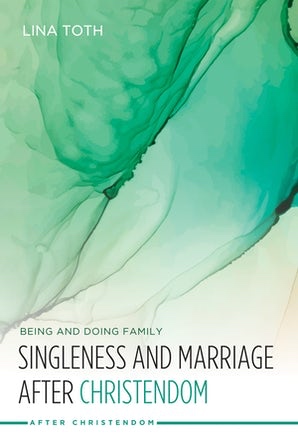Singleness and Marriage after Christendom by Lina Toth
A book to iron out misunderstandings, reduce fears, remove guilt - and warmly to be commended
 Singleness and Marriage After Christendom - Being and Doing Family
Singleness and Marriage After Christendom - Being and Doing Family
By Lina Toth
Wipf and Stock
ISBN: 9781532635588
Reviewed by Alec Gilmore
An extraordinary book. 150 well-documented pages on a couple of life experiences integral to Christendom for 2000 years we are all familiar with (or thought we were).
Now, ‘After Christendom’, everything has changed and Marriage and Singleness are no exception. Marriage is in decline, Singleness is on the rise, co-habitation increasingly common, same sex marriage rapidly gaining recognition, and the nuclear family under threat. Toth, Assistant Principal and Lecturer in Practical Theology at Scottish Baptist College, wisely makes no attempt to address these issues one by one or offer solutions. However, they are the background to the two issues in her title as she digs out the facts for our consideration, inevitably unearthing matters inviting celebration from some and causing alarm for others.
Singleness, for example, should not be identified with loneliness as Toth (a Lithuanian) discovered when she realised that what was simple in English proved impossible in her native language which has only one word for both situations, nor should it suggest an inability to find a partner. Singleness is not only an alternative to marriage, it manifests itself in countless ways as Toth demonstrates.
Marriage (Christian or Civil ), similarly, is not what most of us were taught to believe. One, it is no longer necessarily a man and a woman. Two, its roots have no particular biblical foundation. Three, the teaching of Jesus (minimal) is ambivalent and both Jesus and Paul have at least one foot in abstinence. Christian Marriage did not arrive with the New Testament, the early church or the Anglican Prayer Book.
Having clarified the ‘After Christendom’ differences and digging deep over a vast territory, Toth takes us on a journey of Christian tradition from the Old Testament, through the New Testament, the early church and the Reformation, with a few surprises and not a few shocks, to an understanding of how (and why) we are where we are, with the nuclear family and a popular view of marriage as portrayed by films and novels — love, coupledom and the happy-ever-after syndrome.
‘Being and Doing Family’ (the sub-title) has never been easy but has it ever been more difficult than ‘After Christendom’? With no quick fix or easy answers Toth makes no attempt to find one, but she surely gives us the wherewithal to start thinking, and on that she drops a few hints.
Is it time, for example, to re-learn Love and Happiness, starting with scripture?
Might the exclusiveness of coupledom and the nuclear family benefit from a few singletons to shift the focus, and how about one or two rites of passage for singletons comparable to those familiar to coupledom? Or can we learn a new language when we talk about our lives, not only in formal worship (hymns and sermons), but in everyday conversations and chats, possibly treating singledom rather than coupledom as the norm?
A book to iron out misunderstandings, reduce fears, remove guilt and warmly to be commended.
Alec Gilmore is a Baptist minister
Baptist Times, 28/01/2022